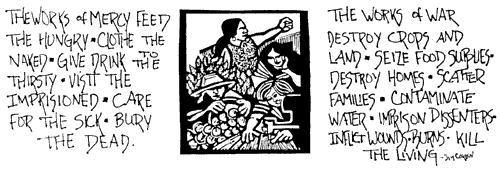In July of 2001, I started volunteering regularly at the Bread & Roses soup kitchen. I loved the pace of work in the kitchen. The mass quantities of food and dishes required us to work briskly, but there were always good conversations and smiles as we worked. Most of the faith communities in the area took rotations for meals, so that on Monday there might be a Buddhist group cooking, and on Tuesday a Catholic team. The guests always helped with the dishes.
The staff of Bread & Roses lived together at the house on 8th Ave. The staff was made up of a handful of young people who offered one year commitments through Brethren Volunteer Services, Selena, a middle aged woman who had left the Carmelite order for the Catholic Worker, and a handful of people who had moved from homelessness to volunteer positions with Bread & Roses.
The “administrator” for Bread & Roses was one of the latter, an impassioned man named Gordy Ebner. Gordy was an odd looking fellow with a long face and thin grey hair pulled back in a pony tail that reached the middle of his back. He wore a long beard and his hooked nose supported a pair of wire framed spectacles. Gordy could be picked out of a crowd by the ridiculous “M.C. Hammer” pants he wore, usually decorated by florescent green geckos or tie-die. Gordy could speak eloquently about our obligations to fight poverty and injustice. He had a powerful charisma that was, no doubt, what landed him in the position of Bread & Roses’ leader. Many of the guests followed Gordy like ducklings lining up behind their mother.
Unfortunately, Gordy was also terribly irresponsible as an administrator. He was abrasive toward those who disagreed with him. He mismanaged Bread & Roses’ funds horribly. His burning desire to help all of the poor exceeded his judgment, and he committed Bread & Roses to projects it was incapable of operating. Many of the guests that he brought on staff were active, violent addicts.
The atmosphere at the soup kitchen reflected Gordy’s influence. It had a definite charm about it, and there was a strong sense of community. Everyone knew each other. It was also deeply marked by illness and depravity. Drug dealing was rampant. Fights were frequent. Ambulances had to be called regularly, and the cops circled the block like vultures scoping out their prey. The cops even wandered through the kitchen, uninvited, from time to time. They wouldn’t speak with anyone, not even the staff who approached them, but just walked around, staring people down.
The atmosphere at the soup kitchen was the inevitable result of providing a very large scale service in a non-authoritarian atmosphere. The large scale of the work required a kind of factory style, impersonal feeding system. Guests formed a line one hundred people deep for a plate of food served across a counter. There was usually only two staff on duty to keep the peace. The volunteers and staff were good hearted, kind people who genuinely cared about the people they were serving.
Unfortunately, caring isn’t enough. The care one feels for another must be communicated for it to make an impact, and it stretches from difficult to impossible to shower authentic compassion on one hundred people at once. The hardships of street life and the hurts of the guests overwhelmed the abilities of the staff, so that the culture of the soup kitchen community became ill.
Many social service agencies would respond to this illness with a set of hard-nosed rules in an attempt to maintain the law and order necessary for effective provision of services. The staff of Bread & Roses, however, had too much heart to degrade the guests with such authoritarian measures. I don’t think it was well understood yet, though, that the factory style, large scale system of the kitchen had undermined the personalist approach of Bread & Roses and degraded the guests in just the way that the staff were attempting to avoid.
It’s too bad, really. It is hard to describe how ambivalent I felt about the old kitchen. On the one hand, the acceptance and openness of the staff to anyone in need was the closest thing to real social justice I had ever seen. I also loved the guests, and delighted in the joys of their community. But the attempt by Bread & Roses to serve beyond its own capacity was taking a toll.
Many of the social services across the country are operated in this way. The overwhelming need for food, shelter, clothing, and health care pushes the people who care to attempt almost heroic feats of charity, to shoulder an unrealistic burden that ought to be spread out across a broader portion of the population. The failure of these heroic attempts to make any real change has become a target of those who hate the poor. The culture at our soup kitchen was the kind of thing that conservatives could point at as the licentiousness caused by liberal, bleeding heart, do-gooderism. And the business community of Olympia did just that.



No comments:
Post a Comment